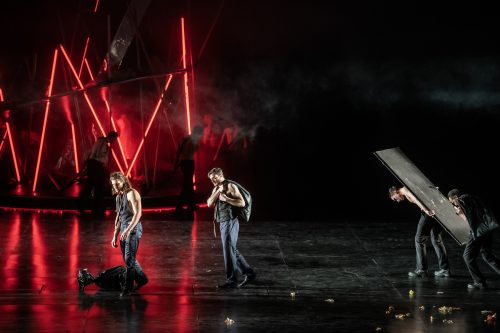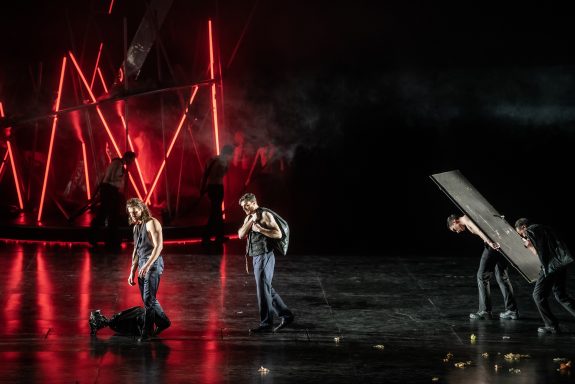 Germany Mozart, Don Giovanni: Soloists, Movement Choir, Chorus (chorus director: Thomas Richter), and Orchestra of the Deutsche Oper / Daniel Cohen (conductor). Deutsche Oper Berlin, 26.6.2024. (MB)
Germany Mozart, Don Giovanni: Soloists, Movement Choir, Chorus (chorus director: Thomas Richter), and Orchestra of the Deutsche Oper / Daniel Cohen (conductor). Deutsche Oper Berlin, 26.6.2024. (MB)

Production:
Director – Roland Schwab
Set designs – Piero Vinciguerra
Costumes – Renée Listerdal
Assistant Choreographer and Revival director – Silke Sense
Cast:
Don Giovanni – Andrzej Filończyk
Donna Anna – Flurina Stuckl
Don Ottavio – Kieran Carrel
Commendatore – Patrick Guetti
Donna Elvira – Maria Motolygina
Leporello – Joel Allison
Masetto – Artur Garbas
Zerlina – Arianna Manganello
Artist – Ellen Urban
We now find ourselves in the twilight zone in which house and hall seasons are drawing to a close, but festivals have already begun. I shall flit back and forth for the next few weeks, albeit with greater emphasis on the latter, but here returned to the former, to Roland Schwab’s production of Don Giovanni for the Deutsche Oper Berlin. I saw it when it was new in 2010 and have deliberately not looked back, though I have a sense that my reaction was somewhat similar: some good ideas but lacking in coherence. That, at any rate, offers a snapshot of my reaction last night. (I shall look back after posting.)
The opening impression is of some sort of crime boss in the title role. His tightly drilled (well-choreographed, though to what end?) entourage features throughout, though I cannot say I found that added much, especially in the strange (drug-induced?) shaking to which many of them often fall prey. A sense of menace is imparted, though perhaps at the cost not only of distraction from the real action, but also and more seriously underlining a sense that, for the most part, especially earlier on, both production and performances seem a little lost on a stage and in a house of this size. Other goings on, whether the dark-suited mob, or an admittedly arresting carnival of death that accompanies rather than drives the first act’s final scene, have a tendency to come across as being put there to fill the space. The well-worn Dantean ‘Lasciate ogni speranza, voi ch’entrate’ is inscribed on a portable door through which the guests arrive (which haphazardly returns briefly, and not when one might expect, in the second act) in a welcome recognition, not the only one, of the work’s religious nature, but ultimately goes for little.
Throughout, much is done with golf clubs, again I suppose intended to underline the masculinity of one side (and yes, I know women play golf too, though it is not clear the production does). Other business, such as constant wielding of whips and a good deal of other noise-making activities, show a tin ear for the reality that this is an opera, in which not only music but some of Mozart’s very greatest music plays a hallowed role. Clearing up mess, literally with bin bags, seems to be Leporello’s business: fair enough, I suppose. At one point, though, the men are in dustbins, which may sound intriguingly Beckettian, yet ends up being another short phase in a production that never seems to know where it is heading. What Don Giovanni’s score card system denotes, I was never quite sure: is a high score good or bad? I presumed the former, but then his final ‘1’ for the Stone Guest scene would make little sense at all.
The audience certainly did not help, laughing, chattering, and so on, seemingly in utter disconnection from what was seen, let alone heard. What should have been a truly powerful moment and marked one of Schwab’s most imaginative ideas, Don Giovanni seating his ‘disciples’ for his last supper, the moment frozen in the painterly manner one might expect, for him to break bread, elicited widespread vigorous laughter. The Eucharist and/or dark inversion thereof are now apparently merely amusing. To be fair, I suppose it would explain a good deal, and if that is the reaction an attempt to address the profoundly religious nature of the work elicits, then, God or Nietzsche help us, perhaps it is more understandable why directors generally and, in most cases, disastrously avoid it.
Why such strange decisions continue to be made concerning the ‘version’ I do not know. It is all very well to blame singers’ desires to give ‘their’ arias, but it is not their decision and they often find themselves oddly deprived too; one cannot imagine them having reached this settlement in any case. However difficult it may be to stand the loss, the Prague version is almost always preferable. If you must, and if you have a performance of such calibre that it and the production can override the problems, the most familiar of the Prague-Vienna conflations, justly maligned, can work. (He said through gritted teeth, thinking what would otherwise always be lost.) ‘Vienna’, insofar as we know what it was, has latterly, unaccountably had a weird renaissance; it is time for that fad to be put to bed. Goodness knows what the reasoning for the combination heard on this occasion was. We heard Mi tradì and Dalla sua pace, though neither Il mio tesoro (odd, given such a fine performance of Don Ottavio’s first aria) nor the Zerlina-Leporello duet. Recitatives were cut and sometimes paused, whilst other things, rarely if ever worth the wait, happened. It made little intrinsic sense, though then given the dramatic looseness of both staging and conducting, it was not particularly a problem either. Ironically, I think production and performance would both have needed to be better or worse for it to matter more.
For Daniel Cohen’s conducting of a Deutsche Oper orchestra that often sounded out of sorts – what a change from its recent magnificent Wagner and Richard Strauss – seemed oddly to mirror the non-committal confusion of Schwab’s staging. It began poorly, balances in a mercilessly hard-driven, tales-of-rasping-brass Overture so awry that one could barely hear the strings. Not so much the conductor’s fault, though still dispiriting, the duet between Donna Anna and Don Ottavio in the first scene pretty much fell apart. Cohen was excellent here in picking this up and moving things on, and whilst there were quite a few subsequent discrepancies between pit and stage, they would be on a smaller scale. When he and the orchestra really clicked, there was some fine playing. The problem was more that rarely, if ever, in the first act and only sporadically in the second was a fundamental pulse established. At best, we heard a string of disconnected arias, recitative often too ‘edited’ to be of much use, the impression being given of ‘accompanying’ a varied recital rather than musically leading the action.
Vocally, there was a good deal to admire. The occasional mishap such as that mentioned above, there was nothing truly to disappoint, although the standard of singing was not always so consistent as it might have been. The moment Maria Motolygina stepped on stage as Donna Elvira, performing voltage shot up; hers was an outstanding performance by any standards, boasting cleanness of line, finely modulated tone, and dramatic commitment: one I was delighted to hear. In the title role, Andrzej Filończyk was excellent, growing in stature and defiance, to boast an enthralling performance in his final scene, helped by new-found proximity to the audience but ultimately founded on charisma and artistry. Joel Allison’s livewire Leporello followed eagerly in his footsteps, at least until then. Patrick Guetti’s Commendatore made a strong impression too. lurina Stucki’s Donna Anna sometimes seemed underpowered, but she recovered and made a good job of her second-act aria. Kieran Carrel’s Dalla sua pace was as sweet-toned and mellifluous as one could wish, though I never sensed that he was quite inside the role (a difficult task, admittedly). I am not sure either of these was really her or his role. Likewise in the case of Zerlina and Masetto. Arianna Manganello and Artur Garbas sang well enough, though they might have made more of what they had to do; in that, they were not necessarily helped by the production.
The worst, I am afraid, came at the end, in the total excision of the final scene. Everything in the work and tonal expectations, specific and general, pull it forward; so too, still more bafflingly, did the production seem to do so. There was, however, nowhere for it to go; it simply stopped and those who, much to my chagrin, were wildly applauding were in a sense right. Yes, Mahler did it; yes, perhaps, given that he was Gustav Mahler, he managed to make it work; no, by any reasonable standards, he was still misguided, partial in his view of the work, surprisingly uncomprehending of its dramaturgy, to have done so. That such an ultra-Romantic route should be taken made no sense whatsoever in context. If the aim were to provoke dissatisfaction, that was certainly achieved; I almost hope it was, since the alternative, sheer cluelessness, is more depressing. Perhaps it was a metaphor, after all, for our age’s strange inability even to attempt to understand this towering opera.
Mark Berry

I saw a Don Giovanni at the Deutsche Oper Berlin some time back. Possibly the same production as reviewed here. The one I saw was one of the worst productions I’ve ever seen. I’ve also never heard as much booing at the end of any performance!
Certainly the worst Don Giovanni i have ever seen; too many trees – no forest at all.
I attended this opera on 11 Nov 2024. It was not clear to me what was being suggested with Don Giovanni’s accompanying gang of men, other than him being a type of criminal, although it was certainly arresting. Was this also a political statement? Donna Elvira’s role was captivatingly played. I did miss parts that were curtailed, such as the very end, and the physical reappearance of the Commendatore as a stone figure.